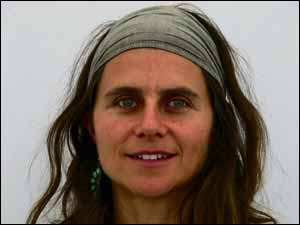|
PROFILE Why Melanie created own marriage ceremony | |
A politics class on heterosexuality and the eroticisation of subordination with British-born radical feminist Professor Sheila Jeffreys gave Dr Landau "a whole way of understanding the world". That feminist analysis, which eventually led her to reject the Jewish marriage concept in which the husband acquires a wife and can result in an agunah situation, led to the publication of Dr Landau's recent scholarly work, Tradition and Equality in Jewish Marriage - Beyond the Sanctification of Subordination, published by Continuum. But it was not plain sailing as at the same time as her feminist conversion Dr Landau began a life-long passionate commitment to Judaism. She was drawn to a campus rabbi who, although having been raised "ultra-Satmar", became influenced by the late Shlomo Carlebach and "went through the whole feeling process". Raised in a traditional Jewish family whose synagogue "that they didn't go to was Orthodox", Melanie had attended a Jewish day school. But there she had "not found Torah as spiritual nourishment". But at university she said: "I started learning Chumash with Rashi with a rabbi every day at 6.30am, as well as Mishnah Brurah and Talmud. "I was connecting to God and to wisdom. We had a unique space where we could learn and have the space to cry and have feelings and really allow ourselves to be transformed by the text inside us." Pain came when Dr Landau brought Jeffreys' feminist principles into "the beth hamedrash". She said: "She was very black and white. She thought theology was part of the patriarchal structure. I was viscerally feeling pain in my body because of the repression, exclusion and marginalisation of the feminine in Jewish texts." Like the feminist influence, the Jewish spiritual one has stayed with Dr Landau all her life. With friends she set up an ashram-type shul with lots of singing on campus. She took a Master's degree in psychoanalytical studies on the work of Carl Jung and then spent four years studying Torah in Jerusalem. Having practised meditation and yoga, Jerusalem-based Dr Landau is the executive director Or HaLev, the Centre for Jewish Spirituality and Meditation. The conflict between Dr Landau's twin passions of Jewish spirituality and feminism came to a head in Tradition and Equality in Jewish Marriage. Although deeply rooted in traditional Judaism and its halachic sources and although married herself in a traditional Jewish ceremony, Dr Landau has deep qualms about the concepts underlying Jewish marriage and the dangers they incur. She has strong issues with the concept of the husband acquiring the wife and feels that the nature of marriage is non-reciprocal especially in connection with the man's ability to withhold a get and create an agunah situation for his wife, as well as in the traditional division of labour within the marriage. One of a new generation of women Torah scholars, deeply immersed in classic halachic texts, she struggles to find classic sources to support new Jewish marriage models more suited to the 21st century with its notions of feminism and gender equality. She was particularly inspired in her work by the 2009 report of Manchester University's Centre for Jewish Studies' Agunah Research Unit and especially by the article by Dr Yehudah Abel on conditional marriages. Dr Landau's book, which pays tribute to the Manchester report, comes up after pages of Talmudic and halachic arguments and sources with two possible solutions. One of which is Abel's conditional marriage proposal in which, prior to the wedding, the groom promises to give a get (Jewish divorce) in the event of marriage breakdown, on pain of which, the marriage would be retroactively annulled. Dr Landau's other possible solution she calls derekh kiddushin (quasi-marriage), which is not halachically a marriage and from which the wife does not require a get. The couple undergo a ceremony under a chuppah in which they pledge themselves to each other without introducing the acquisitional aspect in which the husband takes possession of his wife. Dr Landau says: "Kiddushin, the marriage ceremony, and the acquisition of the woman, which it entails, is a dangerous enterprise. "The current non-reciprocal model of kiddushin is not an appropriate contract for a relationship between equals. Many, if not most, women would not agree to such a relationship if they knew what it entailed. "In addition to the inequality of the structure and the formation of the relationship, the possibility of a woman being stranded in a marriage because of a recalcitrant husband is a risk no woman should be forced to take in the 21st century." While waiting for her suggestions to be implemented within the Orthodox community, Dr Landau has been conducting her own marriage ceremonies, often in tandem with an Orthodox rabbis. Dr Landau managed to bring in innovations to the ceremony more in keeping with an equal society. For example, instead of the man standing under the chuppah and the woman walking round him in a circle, the man and woman meet each other outside the chuppah and walk in together. Dr Landau has worked for some time preparing couples for Jewish marriage, including the woman's immersion in a mikva. She has also done pioneering work in the field of Israeli-Palestinian relations, in her role as Encounter director taking Jewish leaders to meet Palestinians. She has also represented Australian Jews at the Parliament of World Religions. She is researching for Australia's Monash University a project on Australian Jews on 'The Future is Bright - The Coming of Age of a Post-Holocaust Community'.
|
